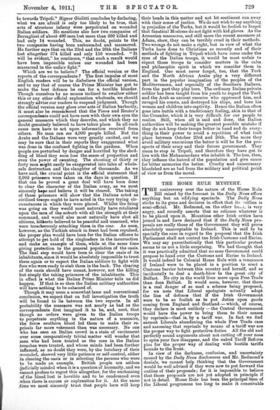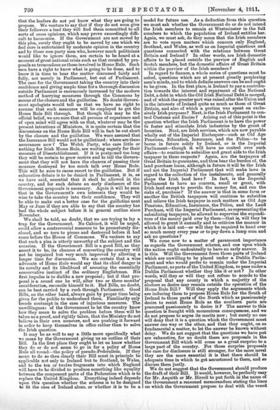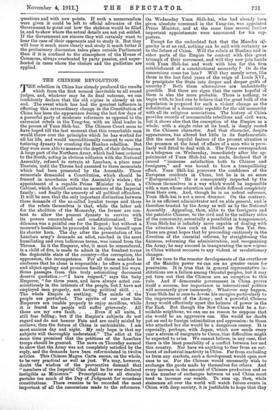THE HOME RULE MYSTERY. T HE controversy over the nature of
the Home Rule Bill raised by the forecast in the Daily News offers anything but an edifying spectacle. The Daily News sticks to its guns and declares in effect that its "utline is semi-official. Mr. Redmond, on the other hard, is very angry, and roundly asserts that no reliance whatever is to be placed upon it. Meantime other Irish critics have joined in and have declared that if the Daily News pro- posals are really those of the Government they will prove absolutely unacceptable to Ireland. This is said to be specially the case in regard to the proposal that the Irish Parliament shall not control the Irish Customs and Excise. We may say parenthetically that this particular protest seems to us not a little surprising. We had thought that it was practically admitted that no sane Government could propose to hand over the Customs and Excise to Ireland. It would indeed be Colonial Home Rule with a vengeance if Ireland were to be placed in a position to erect a Customs barrier between this country and herself, and so incidentally to deal a death-blow to the great city of Belfast. No city in the world lives more upon Free Trade than does Belfast. It would seem, however, that there is a real danger of so mad a scheme being proposed, for we note that Liberal apologists actually adopt the line of defence that if the Irish Government were to be so foolish as to put duties upon goods coming from England and Scotland — which, of course, they declare is most unlikely — the Central Government would have the power to bring them to their senses by reprisals—that is, by a tariff war. In fact we find earnest Liberals abandoning the whole Free Trade case and assuming that reprisals by means of a tariff war are the proper way to fight protective duties. All the old and perfectly sound arguments about not cutting off your nose to spite your face disappear, and the naked Tariff Reform plea for the proper way of dealing with hostile tariffs bounds to the front.
In view of the darkness, confusion, and uncertainty caused by the Daily News disclosures and Mr. Redmond's denials, we cannot help thinking that the Government would be well advised if they were now to put forward the outline of their proposals ; for it is impossible to believe that those proposals are not yet adopted in principle if not in detail. Home Rule has been the principal item of the Liberal programme too long to make it conceivable that the leaders do not yet know what they are going to propose. We venture to say that if they do not soon give their followers a lead they will find them committed to all sorts of cross opinions, which may prove exceedingly diffi- cult to harmonize. If the Government are not moved by this plea, surely they ought to be moved by one which we feel sure is entertained by moderate opinion in the country and by those non-party men who, however much politicians would like to ignore them, are certain to be heard at a moment of great national crisis such as that created by pro- posals so tremendous as those involved in Home Rule. Such men have a right to know what is going to be done, and to know it in time to hear the matter discussed fairly and fully, not merely in Parliament, but out of Parliament. The case for the Government taking the country into their confidence and giving ample time for a thorough discussion outside Parliament is enormously increased by the modern method of hurrying measures through the Commons by means of the closure and the guillotine. No doubt Govern- ment apologists would tell us that we have no right to assume that such measures will be employed to get the Home Rule Bill through. But though this may be the official belief, we are sure that all persons of experience and of open mind will agree with us that, whatever may be the present intentions of Ministers, it is quite certain that the discussions on the Home Rule Bill will in fact be cut short by the closure and the guillotine. We were assured that the Insurance Bill would not be guillotined : where are these assurances now ? The Welsh Party, who care little or nothing for Irish Home Rule, are waiting eagerly for their measure of Disestablishment. If it is postponed too long they will be certain to grow restive and to tell the Govern- ment that they will not have the chances of passing their measure destroyed by too much talk over Home Rule. This will be sure to cause resort to the guillotine. But if exhaustive debate is to be denied in Parliament, it is, as we have said, essential that it shall be allowed in the country, and for such debate an early disclosure of the Government proposals is necessary. Again it will be seen that in the Government's own interests they would be wise to take the country into their confidence. They will be able to make out a better case for the guillotine next May or June if they are able to say that the country has had the whole subject before it in general outline since November.
We shall be told, no doubt, that we are trying to lay a trap for the Government. No Cabinet, it will be urged, could allow a controversial measure to be prematurely dis - closed, and so torn to pieces and destroyed before it had come before the House of Commons. We venture to say that such a plea is utterly unworthy of the subject and the occasion. If the Government Bill is a good Bill, as they assert it to be, its chances of converting the country will not be impaired but very much improved by allowing a longer time for discussion. We are certain that a wise advocate of Home Rule would say that its chief danger is its novelty and its likelihood of arousing the essentially conservative instinct of the ordinary Englishman. His first impulse is to dislike a new proposal ; but if that pro- posal is a sound one he will, after two or three months' consideration, reconcile himself to it. Bad Bills, no doubt, can be best carried by a rush through Parliament. Good Bills, on the other hand, always gain by proper time being given for the public to understand them. Familiarity only breeds contempt in the case of injurious measures. The unwillingness of the Government to let the country know how they mean to solve the problem before them will be taken as a proof, and rightly taken, that the Ministry do not believe in their own measure, and are pushing it forward in order to keep themselves in office rather than to solve the Irish question. It may be as well to say a little more specifically what we mean by the Government giving us an outline of their Bill. In the first place they ought to let us know whether they do or do not mean to go in for a policy of Home Rule all round—the policy of pseudo-Federalism. If they mean to do so then clearly their Bill must in principle be applicable not only to Ireland but to Scotland, to Wales, and to the ten or twelve fragments into which England will have to be divided to produce something like equality between the component parts of the Federation which is to replace the United Kingdom. Everything indeed depends upon this question whether the scheme is to be designed to fit the case of Ireland alone, or whether it is to be a model for future use. As a deduction from this question we must ask whether the Government do or do not intend the Irish members to remain at Westminster in the full numbers to which the population of Ireland entitles her. Again, we must ask, do they mean that the Irish members are to vote upon matters which concern only England, Scotland, and Wales, as well as on Imperial questions and questions connected with the relations between Great Britain and Ireland ? In other words, are Irish domestic affairs to be placed outside the purview of English and Scotch members, but the domestic affairs of Great Britain within the purview of the Irish members ?
In regard to finance, a whole series of questions must be asked, questions which are at present greatly perplexing men's minds, and to which definite answers can be and ought to be given. In the first place, is Ireland to pay a contribu- tion towards the interest and repayment of the National Debt, a debt in which the Old Irish National Debt is merged, and of which the greater part was raised after the Union and in the interests of Ireland quite as much as those of Great Britain, and also of which a portion was spent on exclu- sively Irish purposes ? Next, is the Irish Parliament to con- trol Customs and Excise ? Arising out of this point is the question whether the Irish Parliament is to have the power to foster and stimulate Irish industries by the grant of bounties, Next, are Irish services, which are now payable wholly out of the Imperial Exchequer—such as Old Age Pensions, Education, Insurance, and the Police—to be borne in future solely by Ireland, or is the Imperial Parliament—though it will have no control over such affairs—to continue to subsidize and grant aids to the Irish taxpayer in these respects ? Again, are the taxpayers of Great Britain to guarantee, and thus bear the burden of, the land purchase loans, although in future it will be the Irish and not the Imperial Parliament that will make laws in regard to the collection of the instalments, and generally shape the Irish land laws ? In fact, is the Imperial Parliament to have no concern, small or great, with Irish land except to provide the money for, and run the risks of, purchase? If the answer is that in some form or another the British taxpayers will continue to subsidize and relieve the Irish taxpayer in such matters as Old Age Pensions, Education, Insurance, the Police, and the Land Purchase, will the Imperial Parliament, as representing the subsidizing taxpayers, be allowed to supervise the expendi- ture of the money paid over by them—that is, will they be allowed to grant it annually and to criticise the manner in which it is laid out—or will they be required to hand over so much money every year or to pay down a lump sum and ask no questions ? We come now to a matter of paramount importance as regards the Government scheme, and one upon which the nation ought undoubtedly to have an early answer. It is this. Will the Government force those parts of Ireland which are unwilling to be placed under a Dublin Parlia- ment and who would prefer to remain under the Imperial Parliament, as parts of the United Kingdom, to pass under a Dublin Parliament whether they like it or not ? In other words, will they or will they not refuse to accede to the proposal that any county in which a majority of the electors so desire may remain outside the operation of the Home Rule Bill ? Will they apply the arguments which are inducing them to propose Home Rule for the South of Ireland to those parts of the North which as passionately desire to resist Home Rule as the southern parts are presumed passionately to desire it P The answer to this question is fraught with momentous consequences, and we do not propose to argue its merits now; but surely no one will deny that it is a question which the Government must answer one way or the other, and that they ought, on so fundamental a matter, to let the answer be known without delay. We do not suggest that the questions we have put are exhaustive, for no doubt there are proposals in the Government Bill which will come as a great surprise to a large part of the country. For those surprise proposals the case for disclosure is still stronger, for the more novel they are the more essential it is that there should be adequate time in which to get accustomed to them, and so discuss them justly. We do not suggest that the Government should produce the draft of their Bill. It would, however, be perfectly easy for Mr. Asquith or Mr. Birrell to put forth in the name of the Government a reasoned memorandum stating the lines on which the Government propose to deal with the vexed questions and with new points. If such a, memorandum were given it could be left to official advocates of the Government to point out how the skeleton would be filled in and to show where the actual details are not yet settled. If the Government are sincere they will certainly want to hear the case of their opponents and to study it. But they will hear it much more clearly and study it much better if the preliminary discussion takes place outside Parliament than if it is confined to the atmosphere of the House of Commons, always overheated by party passion, and super- heated in cases where the closure and the guillotine are applied.








































































 Previous page
Previous page